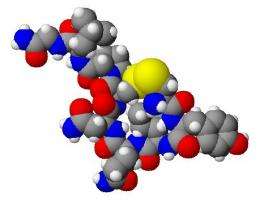Modulating molecules: Study shows oxytocin helps the brain to modulate social signals

Between sights, sounds, smells and other senses, the brain is flooded with stimuli on a moment-to-moment basis. How can it sort through the flood of information to decide what is important and what can be relegated to the background?
Part of the answer, says Catherine Dulac, the Higgins Professor of Molecular and Cellular Biology, may lie with oxytocin.
Though popularly known as the "love hormone," Dulac and a team of researchers found evidence that oxytocin actually plays a crucial role in helping the brain process a wide array of social signals. The study is described in a December 12 paper published in eLife.
The study, Dulac said, suggests that oxytocin acts like a modulator in the brain, turning up the volume of certain stimuli while turning others down, helping the brain to make sense of the barrage for information it receives from one moment to the next.
In investigating the role of oxytocin in processing social signals, Dulac and colleagues began with an oft-observed behavior - the preference for male mice to interact with females.
Studies have shown that this behavior isn't just social - it's actually hard-wired in the brains of male mice.
When male mice are exposed to pheromone signals of females, Dulac and colleagues found, neurons in their medial amygdala showed increased levels of activation. When the same mice were exposed to pheromones of other males, those same neurons showed relatively little stimulation.
Armed with that data, Dulac and colleagues targeted the gene responsible for producing oxytocin - which was known to be involved in social interactions ranging from infant/parent bonding to monogamy in certain rodents.
Using genetic tools, researchers switched the gene off, and were surprised to find that both males' preference for interacting with females and the neural signal in the amygdala disappeared.
"This is a molecule that's involved in the processing of social signals," Dulac said. "We also showed, using pharmacology and genetics, that the effect happens on a moment-to-moment basis.
"What we are trying to do is understand the logic of social interactions in one particular species," she said. "What this study says is, for this particular type of social interaction, oxytocin plays a role, and that role is both at the level of the brain and the behavior."
Understanding oxytocin - and molecules like it - might shed light on a number of brain disorders.
With an understanding of how various neurotransmitters work to amplify or quiet certain stimuli, Dulac said, researchers may gain new insight into how to treat everything from depression, which is often characterized by a lack of interest in social interactions, to autism, which is thought to be connected to an inability to sort through social and sensory stimuli.
Ultimately, Dulac said, the study offers a small glimpse into what could be a larger system of molecules which act like modulators in the brain, turning certain stimuli up or down depending on the situation.
"There may be many different regulators," Dulac said. "Oxytocin might be one of a whole realm of modulators, each of which are important in a particular circumstance. That therefore gives the animal a great deal of plasticity in terms of engaging in a particular behavior, so it's not the case that each time the animal encounters a particular stimulus it will react in exactly the same way. Depending on the state of the brain and the release of these neurotransmitters, the animal can boost its behavior toward the stimulus or ignore it."




















